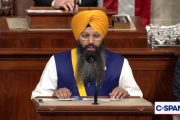
Attorney General Jeff Sessions had two conversations with Russia’s ambassador to the United States last year. Now, lawmakers on Capitol Hill — Democrat and Republican alike — are demanding that he recuse himself from an investigation into whether there was contact between the Trump campaign and the Russian government. Some are even calling for him to resign.
The mainstream media is treating this story as if it were Trump’s Watergate — even though information is still emerging that challenges that narrative. In fact, the social media hashtag #SessionsGate is already trending on both Twitter and Facebook. The brouhaha is centered around the fact that Sessions did not disclose that he met with with Russian Ambassador to the United States Sergey Kislyak on two separate occasions and, in fact, said — in his sworn confirmation testimony — “I did not have communications with the Russians.” That sounds, for all the world, just like perjury. After all, if he said that he “did not have communications with the Russians” when he had, it is pretty cut and dry, right? Only if that is all he said. Because while that is the sum and substance of a plethora of headlines and social media posts, there is more to it than that.
Let’s unpack this a bit.
First, Sessions was answering a very specific question when he said he “did not have communications with the Russians.” That question — asked by Senator Al Franken (D-Minn.) — was, “If there is any evidence that anyone affiliated the Trump campaign communicated with the Russian government in the course of this campaign, what will you do?” Sessions’ complete answer (which is not widely reported) was, “Senator Franken, I’m not aware of any of those activities. I have been called a surrogate at a time or two in that campaign, and I did not have communications with the Russians. And I’m unable to comment.”
Second, the two times last year when Sessions did communicate with Kislyak were in his official capacity as a U.S. senator serving on the Senate Armed Services Committee. As Senator Ted Cruz (R-Texas) said on MSNBC Thursday:
This morning, everyone is in high dudgeon about the meeting. The underlying meeting is a nothing burger. It’s what senators do every day. Meeting with foreign ambassadors, that’s part of the job.
Third, Sessions is a lawyer. As such, he understood that the question he was answering was about what happened “in the course of [the Trump] campaign.” He also understood that his answer was able to be restricted to the question. So why did he not disclose that — in his official capacity as a member of the Senate Armed Services Committee — he had met with Kislyak on two separate occasions? Because he wasn’t asked. As a lawyer, he knows that a witness is required to answer all questions honestly. He also knows that the best course of action is to answer only the questions that are asked. Since his meetings with Kislyak had nothing to do with “the course of [the Trump] campaign,” he was not obliged to disclose them.
Finally, let’s look at those two meetings between Sessions and Kislyak. The first of those was at a Heritage Foundation event at the Republican National Convention in July that had about 50 ambassadors in attendance. Sessions was approached by a small group of those ambassadors with whom he spoke briefly and informally. Spokewoman for the Office of the Attorney General Sara Isgur Flores told the Wall Street Journal, “It was short and informal.”
The second meeting, in September, was not actually a meeting at all. It was a phone call. Flores confirmed the call and said Sessions — who was still a senator at the time — spoke with Kislyak by phone from his office on official business related to his responsibilities as a member of the Senate Armed Services Committee.
In a statement released Wednesday night, Sessions said, “I never met with any Russian officials to discuss issues of the campaign. I have no idea what this allegation is about,” adding, “It is false.”
It appears that President Trump’s establishment enemies in both politics and the media are making much ado about nothing to attack Sessions. And it appears that they are guilty of doing what they accuse Sessions of. By selectively quoting him saying “I did not have communications with the Russians,” while leaving out the question and his full answer as well as the background, they are making his honest answer look like a lie.
The White House released a statement of support for Session that said:
This is the latest attack against the Trump administration by partisan Democrats. Attorney General Sessions met with the ambassador in an official capacity as a member of the Senate Armed Services Committee, which is entirely consistent with his testimony.
While many on both sides of the aisle are calling for Sessions to recuse himself from any investigation into contacts between the Russian government and the Trump campaign, House Minority Leader Nancy Pelosi (D-Calif.) and Rep. Elijah Cummings (D-Md.) are calling for his resignation.
In a statement released Wednesday, Pelosi said:
After lying under oath to Congress about his own communications with the Russians, the Attorney General must resign. Sessions is not fit to serve as the top law enforcement officer of our country and must resign.
Cummings was more pointed. In a statement also released Wednesday, he said:
When Senator Sessions testified under oath that “I did not have communications with the Russians,” his statement was demonstrably false, yet he let it stand for weeks — and he continued to let it stand even as he watched the President tell the entire nation he didn’t know anything about anyone advising his campaign talking to the Russians.
Attorney General Sessions should resign immediately, and there is no longer any question that we need a truly independent commission to investigate this issue.
Interestingly, neither of them called for Hillary Clinton to drop out of the presidential race or expressed that she was “not fit to serve” as president — despite her constant lies to the American people about her mishandling of classified intelligence via her unsecured, private e-mail server in clear violation of the law or her lies to Congress in sworn testimony about Benghazi.





